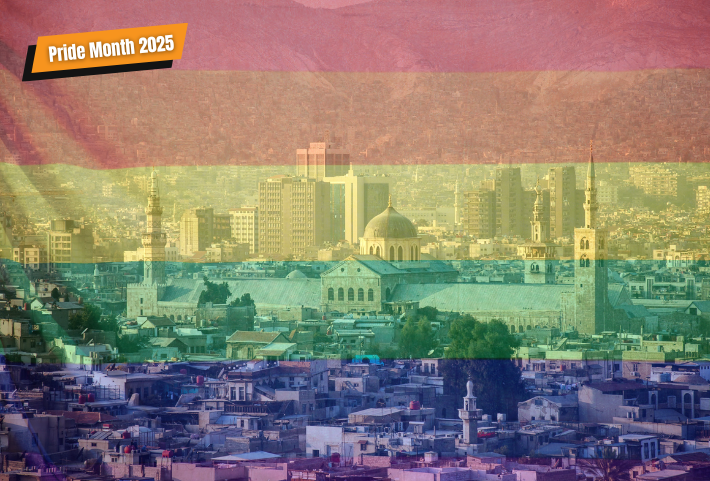By Maysaa Ajjan
When Bashar al-Assad’s iron-fist rule over Syria collapsed last December, it was a moment of revelation for all Syrians at home and abroad. Chief among the revellers were members of Syria’s long-repressed LGBTQ+ community.
“Bashar al-Assad was the biggest violator of the queer community in [Syria],” queer activist Francois Zankih said. “We [as citizens] were part of the revolution that brought down the regime from the very beginning, and we celebrated Assad’s fall.”

Several members of the queer community echoed his sentiment.
“It was a euphoric moment,” Syrian queer member Marilyn Qudsi, who lives in Beirut, said. “I had a feeling of pride and victory.”
However, the community watched with caution laced with fear for what was coming next. Their biggest fear- that the future could be worse than the past- slowly began to be realised as the number of violations to the LGBTQ+ community in Syria rose exponentially in 2025.
According to the Guardians of Equality Movement (GEM), a pro-queer NGO that helps the LGBTQ+ community in Syria and abroad, these violations come in the form of entrapment through dating apps, home raids, abductions, arbitrary arrests, torture, humiliation, threats of physical violence and disfigurement, as well as other dangerous practices such as forced filming and public shaming—putting victims at increasing and continuous risk. They are perpetrated by groups affiliated with al-Sharaa’s government, such as security police, as well as non-state armed groups called outlawed factions.
“I was not altogether surprised to see those violations under the new government,” Qudsi said in a phone call. “You see, I lived under Hayat Tahrir al-Sham (HTS) rule in north-western Syria during the years of the Syrian revolution, and I know their laws.” HTS is the Sunni Islamist al-Qaeda-affiliated armed group that launched the offensive which toppled the Assad regime on December 8, 2024.
HTS is designated as a terrorist organisation by the UN Security Council. The armed group retains a Salafi-jihadist ideology despite its public split from al-Qaeda in 2017, according to several think tanks.
“HTS has the mentality that people living under its rule should conform to one norm,” Qudsi continued. “No plurality of gender, religions and ethnicities is allowed- in fact it is punished.”
Qudsi, who is a queer transgender woman, fled her hometown in Northwestern Syria last year and now lives in Beirut, where she runs a local pro-queer NGO that operates undercover in Syria called Sawtonna.
As the founder of the Guardians of Equality Movement Francois Zankih noticed that the number of violations to the Syrian queer community had jumped by 70 per cent since the fall of the regime in December 2024. A spike like this has never happened before, even under the Assad government, he said.
Since the beginning of 2025, SGSE (Seen for Gender and Sexual Equity), another LGBTQ+ Syrian NGO, has documented 40 violations targeting the queer community by various actors. Interestingly, under the Assad regime, a similar number of violations would typically be recorded for an entire year, according to Hasna, co-director of SGSE.
While the security situation of queers in Syria seems to have gone from bad to worse, there is a possibility that numerous incidents went unreported during Assad’s rule, which nullifies the hypothesis that the numbers have spiked under the new government’s rule.
“The Syrian regime operated through an extensive and repressive intelligence apparatus, which made individuals hesitant to report abuses or reach out to organisations providing relief or documentation,” Hasna said in a statement. “The regime engaged in practices such as forced anal examinations, arbitrary detention of queer individuals, hostile media campaigns, and security crackdowns on areas where queer individuals gathered.”
Today, these attacks are being filmed, bragged about, and widely circulated on social media. In February this year, a shocking video showing security forces in Syria harassing, demeaning and beating a queer man circulated. Both GEM and SGSE released a statement condemning the violations.
Today, queer individuals are actively seeking the support of human rights organisations, a phenomenon that was not so common under the rule of Assad.
“If we were to assess whether the situation is worse or better [than it was during Al Assad’s rule], we would lean towards saying it is worse,” Hasna said. “Under Assad’s decades-long rule, the queer community developed survival tools and tactics, including secret languages, safe gathering spaces, and social solidarity networks that helped them navigate danger.”
Assad’s rule seems to have left a legacy of a torture-ridden state which punishes minorities and marginalised groups, and the LGBTQ+ community is paying the price.
“The queer community is in even more danger than before, and this, in huge part, is the legacy of the ex-regime,” Francoise said.
Today, this queer community is facing a new ruling power with repressive tools which are different, and whose hostility comes from a different place—religious extremism—unlike the Assad regime’s repression, which was rooted in broader suppression of freedoms. Under the rule of al-Sharaa’s government, crackdowns on personal freedoms and individual rights have been almost systematic.
These crackdowns have taken the form of sectarian violence, where governmental forces have clashed with Druze and Alawite communities in the past few months, leading to hundreds of deaths. Recently, where individual rights are concerned, women in areas dominated by HTS in northwestern Syria have been subjected to “draconian” orders regarding their dress, mobility and role in public life, despite HTS claiming early on in December that they wouldn’t tell women how to dress. Such a breach of personal liberties can only lead to grotesque violations of the rights of the LGBTQ+ community, whose rights fall first and foremost under the umbrella of individual freedoms.
“No matter how you look at it, you can’t exonerate the government from these vicious, bloody acts towards the queer community and other victims,” Qudsi said.
